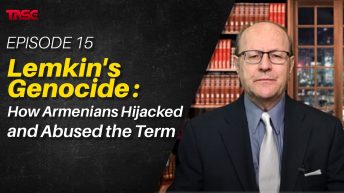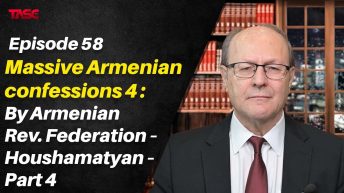Demanding apology while keeping silent about own crimes In Episodes 63, 64, and 65, I shared with you a remarkable letter titled Strategically Mum: The Silence of Armenians, written by Iver Torikian, an Armenian truth-seeker, wondering why there was so much misinformation about Armenian-Turkish relations and why Armenian insurgents and Turkish suffering they caused are never mentioned in Armenian writings.
The Center for Eurasian Studies (AVIM), a research group in Ankara, Türkiye, published that letter in its August 2021 issue, because of the sincere views presented with academic objectivity. That letter triggered our discussion here of social concepts like propaganda, perception management, prejudice, gaslighting, groupthink, cognitive dissonance, and critical thinking. Torikian has come to realize that many Armenians are prejudiced, particularly towards Turks.
A young Armenian cousin in Kinali, Türkiye confessed that he hated all Turks. The agitated wife of an old Armenian friend of his dad in Paris, France, demanded at the breakfast table that Torikian promises to her that he would never marry a Turkish girl. Another Armenian cousin in Canada told Torikian that the cousin believed that Hitler did the right thing by trying to exterminate the Jews. It turned out that the cousin hated Jewish people as much as Turkish people. It is difficult for Torikian to understand how Armenians can simultaneously be nice to him while hating Turks they have never met. Some Armenians want an apology from the Turkish government, while others, reparations.
Still, others want the Turkish government to carve a large part of eastern Türkiye and hand it over to Armenia on a gold platter. Such extreme demands, of course, are ludicrous, for many reasons. Torikian does not support any part of the Armenian Cause, as they all foster vindictiveness towards Turks and Türkiye. Furthermore, Torikian believes, that demanding anything from the present generation of Turks — who had nothing to do with the events of a century ago — are ultimately harmful to all of humanity.
Torikian thinks that few Armenians are willing to admit Armenian hate crimes and war crimes. Out of a million or so Armenians in Türkiye, before WWI writes Torikian, some immigrated to the US or Europe and others remained in Türkiye. Many of those took up arms for one side or another. Some were in the Ottoman army. Others joined the Russian army, either from the outset of the First World War or after deserting the Ottoman army. But most of the young Armenian men and even some women, outside Istanbul, joined one of the many Armenian militias marauding eastern Türkiye. Torikian regrets that such complexity of the Ottoman Empire-Armenian relations was so poorly covered in a biased article in The New Yorker, which is representative of the “groupthink” by most Armenians.
Torikian has often wondered why he has never seen photos of massacred Turks in Anatolia, Bulgaria or Greece a century ago? He thinks the reason is bias, as cameras were owned mostly by well-to-do Christians, and most Christians simply did not care about the Muslim suffering. That goes for the journalists covering the Middle East for Western newspapers (see Episode 60: The Turkish Tragedy in the Balkans.)
Nowadays, Armenians who are considered traitors are by other Armenians denounced and ostracized. Meline Toumani, an Armenian American, is one such person. She published a book titled There Was and There Was Not in the US in 2014. It recounted her experiences of moving to and living in Istanbul, and she wrote about Turkish people in a favorable way. For this, she was blasted in Armenian publications and online. Torikian found very few Armenian scholars who have written impartially about the Armenians of that era.
One such scholar was Louise Nalbandian who published The Armenian Revolutionary Movement in 1963 and wrote on page 171 that ARF program of 1892 officially sanctioned terrorism. Another honest scholar, Torikian thinks, is Ronald Grigor Suny. In his 1993 book Looking Toward Ararat, Suny wrote, for instance, that the Hunchaks sought to use “propaganda, agitation, and terror,” in that order, to achieve their goals. Torikian writes about an Armenian Peter Balakian who in 2003 published a book called The Burning Tigris, with intense anti-Turkish bias, evident on nearly every page. Balakian often fails to substantiate the many claims he makes throughout his book. Balakian says, for example, that the Turkish nationalist army invaded Armenia, totally ignoring the Armenians’ acts of aggression and cruelty towards Turkiye that was the root cause of that Turkish retaliation. Torikian reminds us that Balakian also neglected to mention that in 1918, the Turkish government gave thousands of tons of wheat to Armenia so that its inhabitants could survive their first winter there.




Add comment